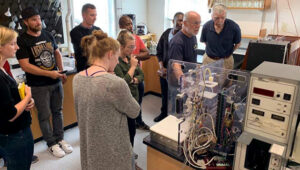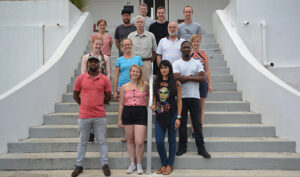Enhancing Workforce Capacity

Last month BIOS and the marine instrumentation company Marianda co-hosted a professional development course in Bermuda to train scientists who use these technologies to take ocean carbon dioxide measurements. Nicholas Bates, BIOS senior scientist, and Dr. Ludger Mintrop, owner of Marianda, led the week-long workshop, which was attended by two BIOS employees and scientists from Belgium, Canada, the Faroe Islands, Ireland, South Africa, and the United Kingdom. Photos by Ali Hochberg.
From September 23 through 27, Professor Nicholas Bates, senior scientist at BIOS and Dr. Ludger Mintrop, owner of Marianda—a company in Kiel, Germany that specializes in instruments for marine chemistry analysis—co-hosted a first-of-its-kind professional development course in Bermuda.
Nearly twenty years ago, when Mintrop first began making instruments in Kiel, Bates purchased the very first instrument—number one off the assembly line—for his lab at BIOS. Now, decades later, the two scientists teamed up to train others in the undertaking of ocean carbon dioxide measurements (specifically dissolved inorganic carbon and alkalinity) to understand ocean function, metabolism, acidification, and the dynamics of ocean carbon dioxide.
“We designed the program to help participants improve the quality and comparability of their measurements and become world-class leaders in the measurement of ocean carbon dioxide,” explained Bates.
BIOS was a natural place to hold the course, not just because of Bates and Mintrop’s existing professional relationship, but also because the marine biogeochemistry lab for the Bermuda Atlantic Time-series Study (BATS) program houses many instruments from Mintrop’s company, making it a natural teaching and learning environment.
“The semi-enclosed privacy of BIOS and its campus-like atmosphere, with all participants sharing meals and accommodation, greatly helped to foster relations and cooperation among the participants,” Ludger said. “They will all remember Bermuda as the perfect place to do marine science.”
Ten participants attended the course, including two BIOS employees and scientists from Belgium, Canada, the Faroe Islands, Ireland, South Africa, and the United Kingdom.

Over a five-day period, participants received hands-on technical training in Marianda instruments used to measure dissolved inorganic carbon and alkalinity. This included not just how to use the instruments, but also repair and maintenance, troubleshooting, and programming.
Aedin McAleer, a research assistant in biogeochemistry at the National University of Ireland at Galway, conducts research on ocean acidification using Marianda instruments. “I found this workshop really useful,” she said. “We covered everything from troubleshooting and maintenance to cleaning and programming. I’m actually confident that I can take my instrument apart and put it back together now.”
Peter Brown, a chemical oceanographer at the National Oceanography Centre in Southampton, United Kingdom, focuses his investigations on calculating the uptake, transport, and accumulation of carbon dioxide by the oceans, as well as the acidification impacts once it is absorbed into the water. “This has been a fantastic workshop enabling the sharing of best practices in instrument operation and tips to improve analytical performance,” he said.
Mutshutshu Tsanwani, a marine biogeochemist with the Department of Environment, Forestry, and Fisheries in Cape Town, South Africa, is responsible for monitoring essential ocean biogeochemical variables, such as nutrients, chlorophyll, dissolved oxygen, and dissolved inorganic carbon. His research focuses on the Benguela Upwelling System, one of four major upwelling systems in the Atlantic and the Pacific Oceans where strong equatorial winds drive surface waters apart, allowing them to be replaced by cool, nutrient-rich waters from the subsurface. “All of the troubleshooting issues that I wanted to learn were addressed,” he said. “I’m glad I came, because I’m going home feeling like an expert.”
For more information on Marianda’s instruments, please visit the company’s website at www.marianda.com.
